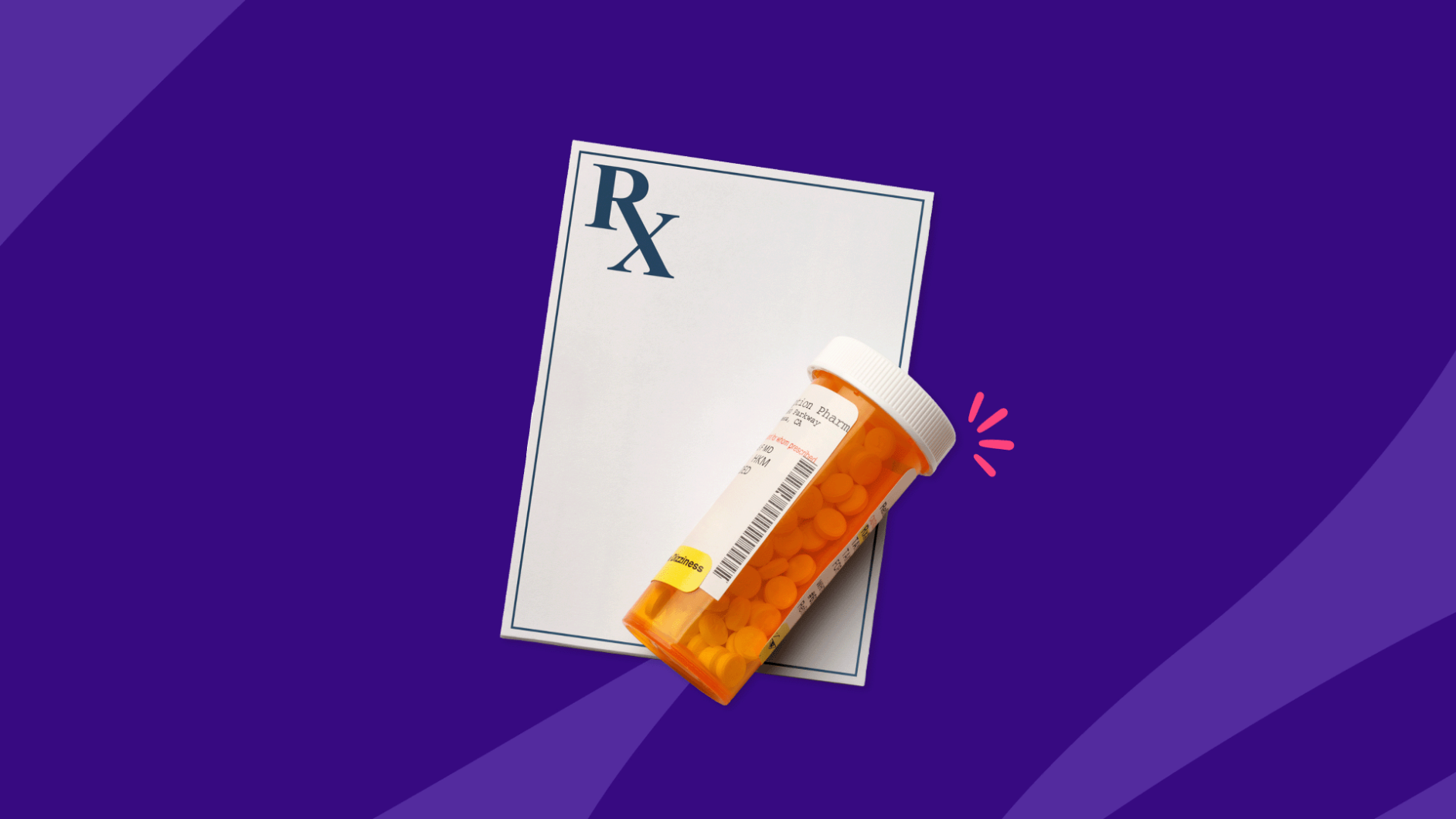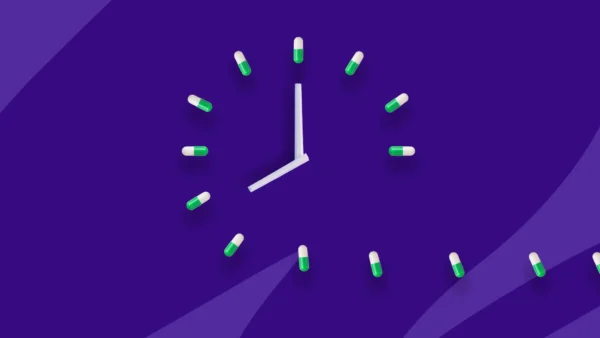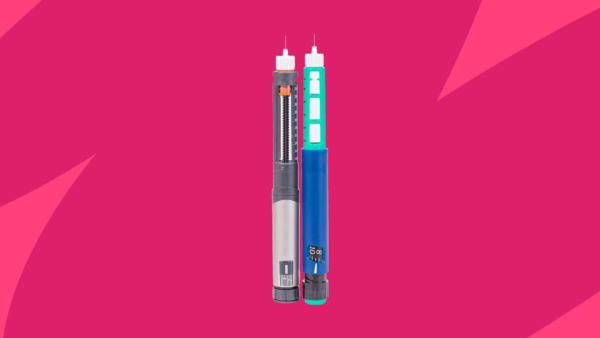Rosuvastatin, also known by the brand name Crestor, is a prescription drug approved by the Food and Drug Administration (FDA) to treat high cholesterol levels. It belongs to a class of drugs called HMG-CoA reductase inhibitors, or statins. By lowering LDL cholesterol and triglycerides, rosuvastatin may help reduce the risk of heart attack and stroke. It’s typically recommended along with a proper diet and exercise plan to help manage cholesterol levels.
While rosuvastatin is an effective drug, it may need to be used with caution if taken with other medications. Potential drug interactions with rosuvastatin could lead to serious side effects, including muscle pain and weakness. Read on to learn more about how rosuvastatin can interact with certain medications and how to reduce the risks of potential problems.
Key takeaways
- Rosuvastatin is a statin medication used to manage cholesterol levels by lowering LDL cholesterol and triglycerides while increasing HDL cholesterol. It’s generally prescribed along with diet and exercise to reduce the risk of heart attack, stroke, and other cardiovascular problems.
- Unlike other statins, such as Zocor (simvastatin), Mevacor (lovastatin), and Lipitor (atorvastatin), rosuvastatin is not significantly processed by CYP3A4 liver enzymes. Therefore, it’s less likely to interact with CYP3A4 enzyme inhibitors like grapefruit juice. However, it still has several interactions with medications that affect the CYP2C9 enzyme.
- There are various potential drug interactions to be aware of while taking rosuvastatin. Certain medications, such as antivirals, fibrates, and antacids, may interact with rosuvastatin, leading to potential adverse effects.
- The effects of drug interactions can range in severity, depending on the drug and dosage. The most serious drug interactions can lead to muscle pain or weakness (myopathy) and the complete breakdown of muscle tissue (rhabdomyolysis).
- Consult a doctor or healthcare provider to discuss interactions and receive guidance on managing them while taking rosuvastatin.
Rosuvastatin-drug Interactions
Rosuvastatin can interact with a variety of prescription and over-the-counter (OTC) medications, potentially leading to side effects and complications. Let’s go over some of the most significant drug interactions between rosuvastatin and other drugs.
Coumadin (warfarin)
Rosuvastatin may interact with warfarin, an anticoagulant used to prevent blood clots, leading to an increased risk of bleeding. If taking rosuvastatin with warfarin, regular monitoring for the risk of bleeding may be needed. Consult a healthcare provider if any unusual bruising or bleeding is experienced while taking rosuvastatin with warfarin.
Certain antacids
Antacids containing aluminum and magnesium can interfere with the absorption of rosuvastatin, potentially reducing its effectiveness. To minimize this interaction, patients should take rosuvastatin at least 2 hours before or 4 hours after taking these antacids. Some common antacids that may interact with rosuvastatin include:
- Maalox (aluminum hydroxide and magnesium hydroxide)
- Mylanta (aluminum hydroxide and magnesium hydroxide)
- Gaviscon (aluminum hydroxide and magnesium carbonate)
Certain antivirals
Some antiviral medications, such as sofosbuvir and velpatasvir, used to treat hepatitis C, can increase the level of rosuvastatin in the blood, potentially increasing the risk of muscle pain. If taking antiviral drugs, a healthcare provider may adjust the dosage of rosuvastatin or recommend an alternative treatment to avoid myopathy or rhabdomyolysis. No more than 10 mg of rosuvastatin is recommended while taking the following antivirals:
- Olysio (simeprevir)
- Viekira Pak (dasabuvir/ombitasvir/paritaprevir/ritonavir)
- Zepatier (elbasvir/grazoprevir)
- Epclusa (sofosbuvir/velpatasvir)
- Mavyret (glecaprevir/pibrentasvir)
- Evotaz (atazanavir/ritonavir)
- Kaletra (lopinavir/ritonavir)
Rosuvastatin is contraindicated while taking Vosevi (sofosbuvir/velpatasvir/voxilaprevir) or Harvoni (ledipasvir/sofosbuvir).
Fibrates
Fibrates are used to lower triglyceride levels and can cause muscle pain or weakness when taken alone. Taking rosuvastatin and a fibrate together may increase the risk of muscle problems like myopathy or rhabdomyolysis. Examples of fibrates include:
- Tricor, Antara, Lipofen (fenofibrate)
- Trilipix (fenofibric acid)
If taking both rosuvastatin and fibrates, a healthcare provider may advise one to monitor for muscle pain or weakness, especially when increasing the dosage of either medication.
Certain anti-cancer agents
Certain anti-cancer agents can interact with rosuvastatin, increasing its blood levels and the risk of toxicity. When taking these medications with rosuvastatin, the rosuvastatin dosage may be adjusted or limited to reduce potential muscle problems. Some of these drugs include:
- Idhifa (enasidenib)
- Tabrecta (capmatinib)
- Nubeqa (darolutamide)
- Stivarga (regorafenib)
Vyndamax (tafamidis)
Rhabdomyolysis has been linked to the use of statins and tafamidis, a drug used to treat cardiomyopathy. Taking tafamidis with rosuvastatin may increase the risk of rhabdomyolysis. It’s generally recommended to avoid taking tafamidis and rosuvastatin together. However, the rosuvastatin dosage can be adjusted if both medications are necessary.
Lopid (gemfibrozil)
Gemfibrozil, a medication used to manage lipid levels, can interact with rosuvastatin, increasing the risk of muscle pain. This interaction is considered severe, and the coadministration of these drugs is not generally recommended. If gemfibrozil and rosuvastatin must be taken together, a healthcare provider may recommend a lower rosuvastatin dosage.
Uloric (febuxostat)
Febuxostat, a medication used to treat gout, can increase rosuvastatin levels in the blood, potentially causing side effects. If taking febuxostat with rosuvastatin, the rosuvastatin dosage may be limited to no more than 20 mg daily.
Colcrys (colchicine)
Colchicine, another medication used to treat gout, can interact with rosuvastatin, increasing the risk of muscle problems. A healthcare provider may recommend a change in medications or monitoring for muscle pain or weakness while taking both drugs together.
Niacor, Niaspan (niacin)
Niacin, a vitamin B3 supplement available via prescription or over the counter, can increase the risk of muscle problems when taken with rosuvastatin. A healthcare provider may recommend avoiding high doses of niacin or suggest an alternative medication.
Rosuvastatin-food Interactions
Rosuvastatin can be taken with or without food, as eating a meal has not been shown to affect the drug’s absorption. However, rosuvastatin is usually recommended along with a heart-healthy diet. For example, a nutrient-rich diet high in fruits, vegetables, and lean proteins may help lower cholesterol levels and reduce the complications of heart disease.
Rosuvastatin and caffeine
There is limited information on the interaction between rosuvastatin and caffeine. However, moderate consumption of caffeine, such as a cup of coffee or tea, is unlikely to cause significant issues for most people taking this medication. Some studies suggest that caffeine may cancel out some of the cardioprotective effects of rosuvastatin. One should discuss any concerns about caffeine and medications with a healthcare professional.
Rosuvastatin and alcohol
Alcohol is not known to interact with the absorption of rosuvastatin. However, excessive amounts of alcohol over time may contribute to liver problems, such as liver disease. As rosuvastatin may also cause liver problems in some people, it’s generally recommended to limit alcohol consumption while taking this medication. Consult a healthcare provider if symptoms like fever, fatigue, abdominal pain, dark urine, or yellowing of the eyes or skin are experienced.
Other rosuvastatin interactions
Rosuvastatin may interact with various dietary supplements, including vitamins, minerals, and herbal remedies. These interactions may lead to possible adverse effects like decreased effectiveness or increased side effects of rosuvastatin. Dietary substances that can interact with rosuvastatin include:
- St. John’s wort: St. John’s wort is an herbal supplement for its potential antidepressant properties. However, it may interfere with the metabolism of rosuvastatin, decreasing its effectiveness.
- Red yeast rice: Red yeast rice contains monacolin K, a compound similar to statins. Using this supplement with rosuvastatin may amplify the risk and severity of muscle-related problems.
- Magnesium: While magnesium can be a useful supplement to support the body, it may interfere with the absorption of rosuvastatin, potentially decreasing its effectiveness. It’s recommended to separate taking magnesium supplements and rosuvastatin by at least 2 hours.
Consult a healthcare provider for medical advice on the safety and effects of taking rosuvastatin with dietary supplements.
Other considerations
If one has certain medical conditions, one may also need to take note of certain precautions while taking rosuvastatin. Various factors that need to be considered when taking rosuvastatin include the following:
- Liver problems: If liver conditions exist, tread lightly when taking rosuvastatin, as the liver plays a central role in processing this medication. A healthcare provider may recommend avoiding rosuvastatin if one has liver failure or severe liver disease. Regular liver function tests might be necessary, and any signs of liver problems, such as yellowing skin or eyes, should be brought to the attention of a healthcare provider.
- Allergic reactions: If a history of allergies to rosuvastatin or any of its ingredients is present, do not take it. Symptoms of allergies might include skin rash, itching, swelling, and difficulty breathing.
- Pregnant or breastfeeding: Rosuvastatin is typically not recommended for those who are pregnant or breastfeeding due to potential risks of harm to a developing fetus or nursing infant.
- Age over 65, hypothyroidism, kidney problems, and Asian descent: Older adults and those with thyroid problems or kidney disease may have a higher risk of muscle problems while taking rosuvastatin. In addition, research also shows that individuals of Asian descent might absorb rosuvastatin at a higher rate, potentially increasing the risk of myopathy or rhabdomyolysis.
Discuss any medical conditions with a healthcare provider before taking rosuvastatin. A different dosage or medication may be recommended if certain risk factors for serious problems exist.
How to minimize rosuvastatin interactions
Managing potential drug interactions while taking rosuvastatin is important. Here’s how to minimize rosuvastatin interactions.
First, always consult a healthcare provider before starting rosuvastatin. They can evaluate potential risks and benefits, especially if on other medications. Be sure to tell the healthcare provider about all current medications being taken, including:
- Prescription medications
- OTC drugs
- Herbal supplements
- Vitamins and minerals
Based on the medication list, the healthcare provider can adjust dosages, suggest alternative medications, or even discontinue certain drugs to reduce the risk of interactions. In some cases, they may recommend a lower dose of rosuvastatin to reduce the risk of potential issues.
Familiarizing oneself with potential warning signs of drug interactions is recommended. Recognizing possible issues in their early stages can help individuals to seek prompt medical attention when necessary. Some warning signs of rosuvastatin interactions include:
- Unexpected side effects
- New symptoms or worsening of existing conditions
When to talk to a healthcare provider about rosuvastatin interactions
Generally, people have a conversation about potential drug interactions during the initial visit when the healthcare provider prescribes rosuvastatin. A local pharmacist can be consulted as well if concerns about drug interactions arise.
Talk to healthcare professionals about rosuvastatin interactions if one:
- Takes any prescription or over-the-counter medications
- Uses any dietary supplements or herbal products
- Has any medical conditions or a history of illnesses
- Experience any unexpected side effects or changes in health, like yellowing of the skin or eyes, extreme fatigue, or unexplained muscle pain or weakness
This is not a complete list of rosuvastatin interactions. Be proactive in discussing an overall medical history with a healthcare provider before starting treatment with rosuvastatin.
Sources
- Rosuvastatin, National Library of Medicine (2023)
- Highlights of prescribing information, Food and Drug Administration (2023)
- The effect of a combination antacid preparation containing aluminium hydroxide and magnesium hydroxide on rosuvastatin pharmacokinetics, Current Medical Research and Opinion (2008)
- Rhabdomyolysis in the setting of concomitant use of tafamidis, atorvastatin, and amiodarone, JACC Case Reports (2020)
- Reduced efficacy of rosuvastatin by St. John’s Wort, The American Journal of Medicine (2009)
- Myopathies associated with red yeast rice and liquorice: spontaneous reports from the Italian Surveillance System of Natural Health Products, British Journal of Clinical Pharmacology (2008)
- Rosuvastatin pharmacokinetics in Asian and White subjects wild-type for both OATP1B1 and BCRP under control and inhibited conditions, Journal of Pharmaceutical Sciences (2017)











